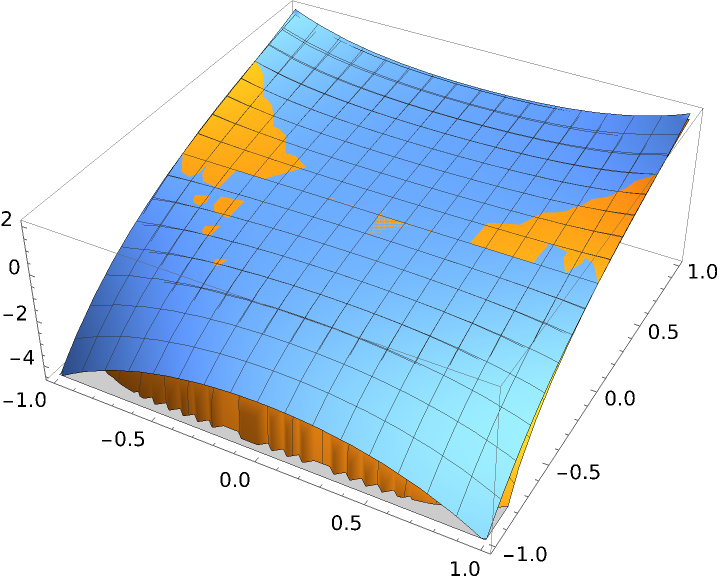Wolfram Function Repository
Instant-use add-on functions for the Wolfram Language
Function Repository Resource:
Compute the Taylor polynomial of a given order of a function of one or several variables
ResourceFunction["TaylorPolynomial"][f,{x,x0,n}] computes the Taylor polynomial of the function f of a single variable about the point x0 of degree n. | |
ResourceFunction["TaylorPolynomial"][f,{x,y,…},{x0,y0,…},n] computes the Taylor polynomial of the function f of several variables about the point (x0,y0,…) of degree n. |
A simple example:
| In[1]:= |
| Out[1]= |
It returns the same result as:
| In[2]:= |
| Out[2]= |
An example of a Taylor polynomial of a function of three variables:
| In[3]:= |
| Out[3]= |
Compare with Mathematica's Series command. The two commands treat the expansion differently; TaylorPolynomial expands to a total degree of each term, while Series expands in each variable separately:
| In[4]:= |
| Out[4]= |
Here is the difference between the two commands:
| In[5]:= |
| Out[5]= |
The Taylor polynomial of a function of two variables:
| In[6]:= |
| Out[6]= |
Plot the function together with its fifth degree Taylor polynomial:
| In[7]:= |
| Out[7]= |  |
The Taylor polynomial of a function with a removable singularity at the origin:
| In[8]:= | ![Clear[f]
f[x_, y_] := Sin[x y^2]/(x y^2)
ResourceFunction["TaylorPolynomial"][f[x, y], {x, y}, {0, 0}, 18]](https://www.wolframcloud.com/obj/resourcesystem/images/634/634a6782-b896-40b8-bb01-06b95ff27a61/05219a26f49bba8b.png) |
| Out[10]= |
This can be obtained by making a simple substitution in a univariate function:
| In[11]:= |
| Out[11]= |
The Taylor polynomial of degree 2 for a symbolic function centered at (a,b):
| In[12]:= |
| Out[13]= |
An infinitely differentiable function of one variable that is not the zero function but all of whose Taylor polynomials are 0:
| In[14]:= | ![Clear[f]
f[x_] := \[Piecewise] {
{Exp[-(1/x^2)], x > 0},
{0, x <= 0}
}
ResourceFunction["TaylorPolynomial"][f[x], {x, 0, #}, "UseLimit" -> True] & /@ Range[8]](https://www.wolframcloud.com/obj/resourcesystem/images/634/634a6782-b896-40b8-bb01-06b95ff27a61/2ee17a9f607b08e2.png) |
| Out[16]= |
Without using limits:
| In[17]:= | ![Clear[f]
f[x_] := \[Piecewise] {
{Exp[-(1/x^2)], x > 0},
{0, x <= 0}
}
ResourceFunction["TaylorPolynomial"][f[x], {x, 0, #}] & /@ Range[8] // Simplify](https://www.wolframcloud.com/obj/resourcesystem/images/634/634a6782-b896-40b8-bb01-06b95ff27a61/7a7525b985bc1240.png) |
| Out[19]= |
An infinitely differentiable function of two variables that is not the zero function but all of whose Taylor polynomials are 0:
| In[20]:= | ![Clear[f]
f[x_, y_] := \[Piecewise] {
{x Exp[-1/(x^2 + y^2)], {x, y} != {0, 0}},
{0, True}
}
ResourceFunction["TaylorPolynomial"][f[x, y], {x, y}, {0, 0}, #, "UseLimit" -> True] & /@ Range[8]](https://www.wolframcloud.com/obj/resourcesystem/images/634/634a6782-b896-40b8-bb01-06b95ff27a61/21f73a925366c932.png) |
| Out[22]= |
Without using limits:
| In[23]:= | ![f[x_, y_] := \[Piecewise] {
{x Exp[-1/(x^2 + y^2)], {x, y} != {0, 0}},
{0, True}
}
ResourceFunction["TaylorPolynomial"][f[x, y], {x, y}, {0, 0}, #] & /@ Range[8]](https://www.wolframcloud.com/obj/resourcesystem/images/634/634a6782-b896-40b8-bb01-06b95ff27a61/3f9de9dee1729aa7.png) |
| Out[24]= |
This work is licensed under a Creative Commons Attribution 4.0 International License